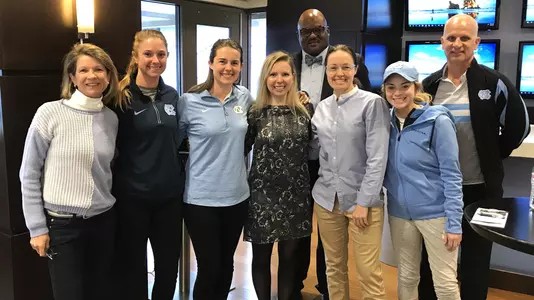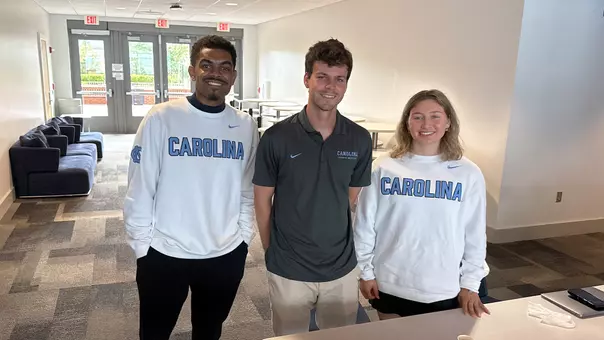University of North Carolina Athletics

UNC coaches and staff with featured speaker Rachael Flatt (center, in black)
Carolina's Blue OPS Puts Spotlight On Healthy Eating
April 10, 2019 | Leadership Academy, Student-Athlete Development
In a continuing quest to improve the Carolina experience for student-athletes, UNC coaches, administrators and staff gathered on April 2 to hear about the dangers of disordered eating in athletes from a speaker with first-hand knowledge of the problem. Rachael Flatt, a former national champion figure skater, is pursuing her Ph.D. in clinical psychology at UNC and spoke to the group about the mental health aspects of disordered eating and eating disorders.
The discussion was part of UNC's Blue OPS (Optimal Performance Series) program, which educates coaches and staff under the umbrella of the Richard A. Baddour Carolina Leadership Academy. Each month those who work with Tar Heel student-athletes get together to learn about a topic associated with student-athlete success, and Flatt was an ideal choice for the series.
She spoke of the difficulty she experienced when she stopped competing. "I no longer had that identity as an athlete to rely on," Flatt said, noting that people are more likely to develop mental health disorders at times of transition. "Everyone deals with difficulty during major life transitions, but those can be more difficult for athletes."
Flatt credited Carolina Athletics for fostering a culture in which student-athletes feel more comfortable talking about mental health challenges they may face. Carolina has emphasized the importance of mental health to overall health and physical performance and has taken several steps to boost mental health awareness. Those steps include increasing mental health staff and hosting student-athlete events such as a recent evening of Mental Health TED Talks and a student-athlete panel in 2018. This spring, UNC launched a student-athlete Body Positive Group.
"Athletes are at high risk of developing eating disorders, so we feel like it's really important to get the conversation started and reduce the stigma," said Rachel Manor, UNC's Director of Olympic Sports Nutrition. "We want to promote a healthy lifestyle for every one of our student-athletes, and being mentally healthy is crucial for their success, both at Carolina and in the future."
Flatt discussed the risk factors of eating disorders, presenting data on their prevalence among athletes vs. non-athletes, particularly in the so-called "aesthetic sports" like gymnastics and figure skating and weight-based sports like wrestling and lightweight rowing. She also spoke of some of the barriers to treatment and reasons that athletes, while more likely to struggle with disordered eating, are less likely to seek help for it. Reasons include the perceived stigma surrounding mental health treatment, the perception that asking for help involves weakness, and the fear that seeking help or treatment may require giving up a starting spot or key position on the team.
The program ended with next steps and ways to create a healthy training environment that includes intuitive eating practices and body positivity. Some suggestions for coaches and staff: Be mindful about comments that are made, know your referral network and where to go for help, and create a healthy training environment that emphasizes body positivity and intuitive eating.
"This is such an important topic, and I think we all appreciated the opportunity to hear from Rachael – as a former competitive athlete, she has a perspective that resonated with our coaches and staff," said Dwight Hollier, UNC's Senior Associate A.D. for Student-Athlete Health, Well-Being & Program Outreach. "The mental health of our student-athletes is our highest priority and we strive to constantly be learning more about ways we can help them be as healthy as possible."
UNC Men's Basketball: Tar Heels Battle Back to Top #14 Virginia, 85-80
Saturday, January 24
Carolina Insider - Interview with Reese Brantmeier (Full Segment) - January 23, 2026
Saturday, January 24
UNC Gymnastics: Tar Heels Down Pitt in Carmichael
Saturday, January 24
UNC Women's Basketball: Tar Heels Outlast Georgia Tech, 54-46
Friday, January 23




